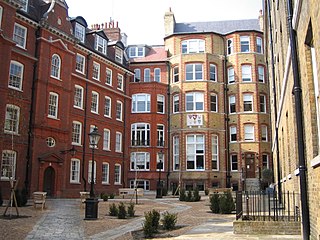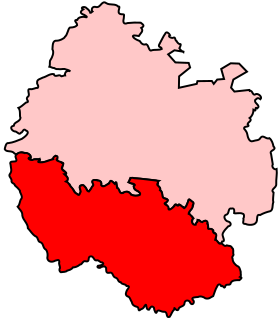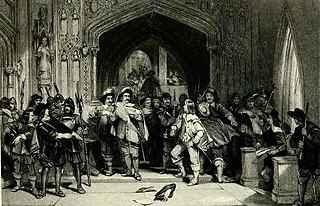
Edmund Weaver (2 February 1610 – March 1672) was an English politician who sat in the House of Commons at various times between 1646 and 1660.

The House of Commons of England was the lower house of the Parliament of England from its development in the 14th century to the union of England and Scotland in 1707, when it was replaced by the House of Commons of Great Britain. In 1801, with the union of Great Britain and Ireland, that house was in turn replaced by the House of Commons of the United Kingdom.
Weaver was the son of Richard Weaver (MP) of the Above Eign, Hereford and his wife Katherine Fox. He matriculated at Oriel College, Oxford on 20 June 1628 aged 17. He was then a student at the Inner Temple and qualified as a barrister in 1637. [2] His father died in 1642.

Oriel College is a constituent college of the University of Oxford in Oxford, England. Located in Oriel Square, the college has the distinction of being the oldest royal foundation in Oxford. In recognition of this royal connection, the college has also been known as King's College and King's Hall. The reigning monarch of the United Kingdom is the official Visitor of the College.

The Honourable Society of the Inner Temple, commonly known as Inner Temple, is one of the four Inns of Court in London. To be called to the Bar and practise as a barrister in England and Wales, an individual must belong to one of these Inns. It is located in the wider Temple area of the capital, near the Royal Courts of Justice, and within the City of London.
In 1646, Weaver was elected Member of Parliament for Hereford as a recruiter to the Long Parliament. [3] He withdrew in the aftermath of Pride's Purge in 1648, refusing to take part in the Rump Parliament. [4] He returned to the Restored Rump Parliament in December 1659. [2] [4]

Hereford was, until 2010, a constituency of the House of Commons of the Parliament of the United Kingdom. Since 1918, it had elected one Member of Parliament (MP) by the first-past-the-post voting system.

The Long Parliament was an English Parliament which lasted from 1640 until 1660. It followed the fiasco of the Short Parliament which had convened for only three weeks during the spring of 1640, and which in turn had followed an 11-year parliamentary absence. In September 1640, King Charles I issued writs summoning a parliament to convene on 3 November 1640. He intended it to pass financial bills, a step made necessary by the costs of the Bishops' Wars in Scotland. The Long Parliament received its name from the fact that, by Act of Parliament, it stipulated it could be dissolved only with agreement of the members; and, those members did not agree to its dissolution until 16 March 1660, after the English Civil War and near the close of the Interregnum.

Pride's Purge was an event that took place in December 1648, during the Second English Civil War, when troops of the New Model Army under the command of Colonel Thomas Pride forcibly removed from the Long Parliament all those who were not supporters of the Grandees in the New Model Army and the Independents. Some have called it a coup d'état.
Weaver died in 1672 at the age of 62.
Weaver married Mary Elton in 1633. [1] His daughter Margaret married Griffith Jones, MP for Radnor. [5]




